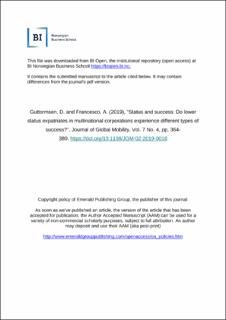Status and Success: Do Lower Status Expatriates in Multinational Corporations Experience Different Types of Success?
Journal article, Peer reviewed
Submitted version

View/
Date
2019Metadata
Show full item recordCollections
- Scientific articles [2181]
Abstract
Purpose
The purpose of this paper is to examine how low status expatriates (lower position, younger, female) are positioned differently compared to high status expatriates (higher position, older, male) in terms of experiencing various types of success.
Design/methodology/approach
Based on 424 responses from business expatriates working within multinational corporations operating in Asia, the study tests whether low status expatriates experience higher personal success while high status expatriates see more organization-related success.
Findings
The results demonstrate that expatriates with different status-related characteristics might experience success during an international assignment differently. Additionally, our results reveal the relevance of avoiding treating success as a single variable and of investigating the actual experiences acquired while working abroad to better appreciate how expatriates experience success differently.
Originality/value
The extant literature offers a limited understanding of expatriate success as the phenomenon has often been conceptualized in relatively simple terms, i.e., the completion of the international assignment contract. Our study offers an alternative view. Measuring success using a single outcome variable does not fully capture the experience. Success can be perceived in different ways, and different types of success are associated with different types of characteristics.